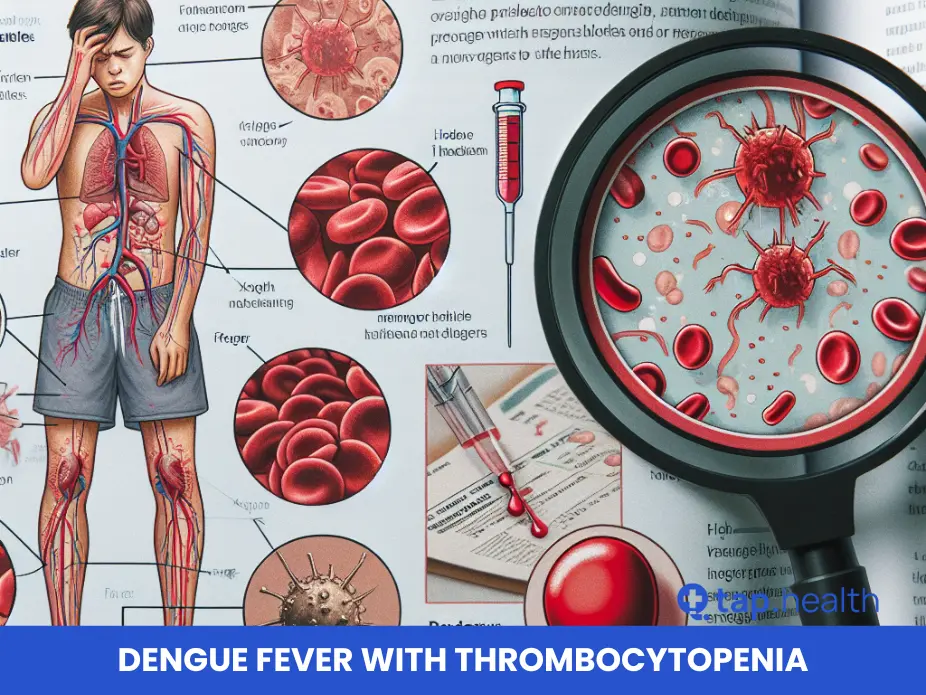Dengue fever, a mosquito-borne viral illness, affects millions globally and can lead to serious complications like thrombocytopenia, a condition characterized by low platelet count. This blog explores the causes, symptoms, diagnosis, and treatment options for thrombocytopenia in dengue fever, alongside preventive strategies and emerging therapies. By understanding this condition, you can take proactive steps to manage and prevent its impact.
What is Thrombocytopenia in Dengue Fever?
Thrombocytopenia refers to a low platelet count, a common complication in dengue fever. Platelets are essential for blood clotting, and their reduction can increase bleeding risks. In dengue, thrombocytopenia results from decreased platelet production, destruction in the bloodstream, and consumption during bleeding repair. Early identification and management are crucial for better patient outcomes.
Causes of Thrombocytopenia in Dengue
The dengue virus triggers thrombocytopenia through multiple mechanisms:
- Bone Marrow Suppression: The virus infects bone marrow cells, disrupting platelet production.
- Platelet Destruction: The immune system may mistakenly target platelets with dengue antibodies, leading to their destruction.
- Endothelial Damage: The virus damages blood vessel linings, causing leakage and increased platelet consumption to repair these sites.
These factors collectively lower platelet counts, heightening the risk of bleeding complications.
Symptoms of Thrombocytopenia in Dengue
Recognizing thrombocytopenia symptoms in dengue is vital for timely intervention. Common signs include:
- Easy Bruising: Minor bumps cause noticeable bruises.
- Petechiae: Tiny red or purple spots on the skin due to minor bleeds.
- Nosebleeds and Gum Bleeding: Spontaneous or prolonged bleeding from minor injuries.
- Heavy Menstrual Bleeding: Increased menstrual flow in women.
- Severe Cases: Internal bleeding, indicated by blood in urine, stool, or vomit, or neurological symptoms like headaches and confusion.
Immediate medical attention is critical for severe symptoms to prevent life-threatening complications.
Diagnosing Thrombocytopenia in Dengue
Diagnosing thrombocytopenia involves a combination of clinical evaluation and laboratory tests:
- Complete Blood Count (CBC): Measures platelet levels to confirm thrombocytopenia.
- Liver Function Tests (LFTs): Assesses liver health, as dengue can cause liver damage linked to thrombocytopenia.
- Coagulation Profile: Evaluates blood clotting ability, identifying risks of prolonged bleeding.
- Ultrasound Imaging: Detects fluid accumulation or organ issues related to dengue severity.
- Bone Marrow Examination: Used in severe cases to investigate underlying causes of low platelet count.
Early diagnosis through these tests enables timely treatment to prevent complications.
Treatment Options for Thrombocytopenia in Dengue
Treating thrombocytopenia in dengue focuses on managing the virus and preventing bleeding complications. Common approaches include:
- Supportive Care: Rest, hydration, and paracetamol for fever and pain relief are standard. Most cases resolve as the body fights the virus.
- Platelet Transfusion: Reserved for severe cases with significant bleeding or critically low platelet counts. Studies suggest transfusions may not always reduce bleeding risks and carry risks like fluid overload.
- Emerging Therapies: Antiviral drugs and immunomodulatory therapies are under research to target the virus and reduce harmful immune responses.
Treatment decisions should be individualized, considering the patient’s condition and risks.
Preventive Measures for Dengue and Thrombocytopenia
Preventing dengue is the most effective way to avoid thrombocytopenia. Key strategies include:
- Mosquito Control: Eliminate breeding sites by removing stagnant water and using larvicides or insecticides.
- Personal Protection: Use mosquito repellents, wear long-sleeved clothing, and install window screens.
- Community Efforts: Public awareness campaigns and clean-up drives reduce mosquito populations.
- Vaccination: Dengvaxia, the first dengue vaccine, is effective for those with prior dengue exposure but carries risks for others. Ongoing research aims to develop safer vaccines.
Nutritional and Lifestyle Support
While no specific diet cures dengue, proper nutrition and lifestyle adjustments aid recovery:
- Diet Recommendations: Consume vitamin C-rich foods (citrus fruits, papaya) and vitamin K-rich foods (spinach, kale) to support immunity and clotting. Stay hydrated with water, coconut water, or oral rehydration solutions.
- Exercise Guidelines: Rest is essential during acute illness. Gradually reintroduce light activities like walking or yoga during recovery, avoiding overexertion.
- Health Monitoring: Regular blood tests to track platelet counts and prompt reporting of bleeding symptoms are crucial.
Psychological Impact of Dengue and Thrombocytopenia
Dengue and thrombocytopenia can cause significant emotional stress, including anxiety and fear of complications. Social stigma and isolation may exacerbate these feelings.
- Coping Strategies: Open communication with family, relaxation techniques like meditation, and professional counseling can alleviate stress.
- Mental Health Support: Cognitive-behavioral therapy (CBT) and mindfulness practices help manage anxiety and improve well-being.
- Community Education: Awareness programs reduce stigma and empower communities to support affected individuals.
Advances in Dengue and Thrombocytopenia Management
Ongoing research is transforming dengue management:
- Antiviral Drugs: New drugs aim to inhibit viral replication, reducing thrombocytopenia severity.
- Immunomodulatory Therapies: These control harmful immune responses to minimize platelet destruction.
- Vaccine Development: Safer, more effective vaccines are being tested to protect against all dengue serotypes.
- AI and Predictive Analytics: Technologies like NLP help predict outbreaks and identify at-risk patients for early intervention.
These innovations promise better outcomes for dengue patients in India and beyond.
Government and NGO Roles in Dengue Control
Governments and NGOs play critical roles in combating dengue:
- Policies and Programs: National plans focus on mosquito control, public education, and healthcare access.
- Community Engagement: Awareness campaigns and clean-up drives empower communities to prevent dengue.
- Research Funding: Support for vaccine and treatment development is essential for long-term control.
International collaboration enhances these efforts by sharing knowledge and resources.
Frequently Asked Questions
1. What are the first signs of thrombocytopenia in dengue?
Early signs include easy bruising, petechiae (small red spots), nosebleeds, and prolonged bleeding from minor cuts. Seek medical help promptly.
2. How can one increase platelet count naturally during dengue?
Papaya leaf extract, vitamin C-rich foods, hydration, and rest may support platelet recovery. Avoid medications that further lower platelets.
3. Is platelet transfusion always necessary for dengue patients?
No, transfusions are reserved for severe cases with significant bleeding or critically low platelet counts, as they may not always benefit patients.



